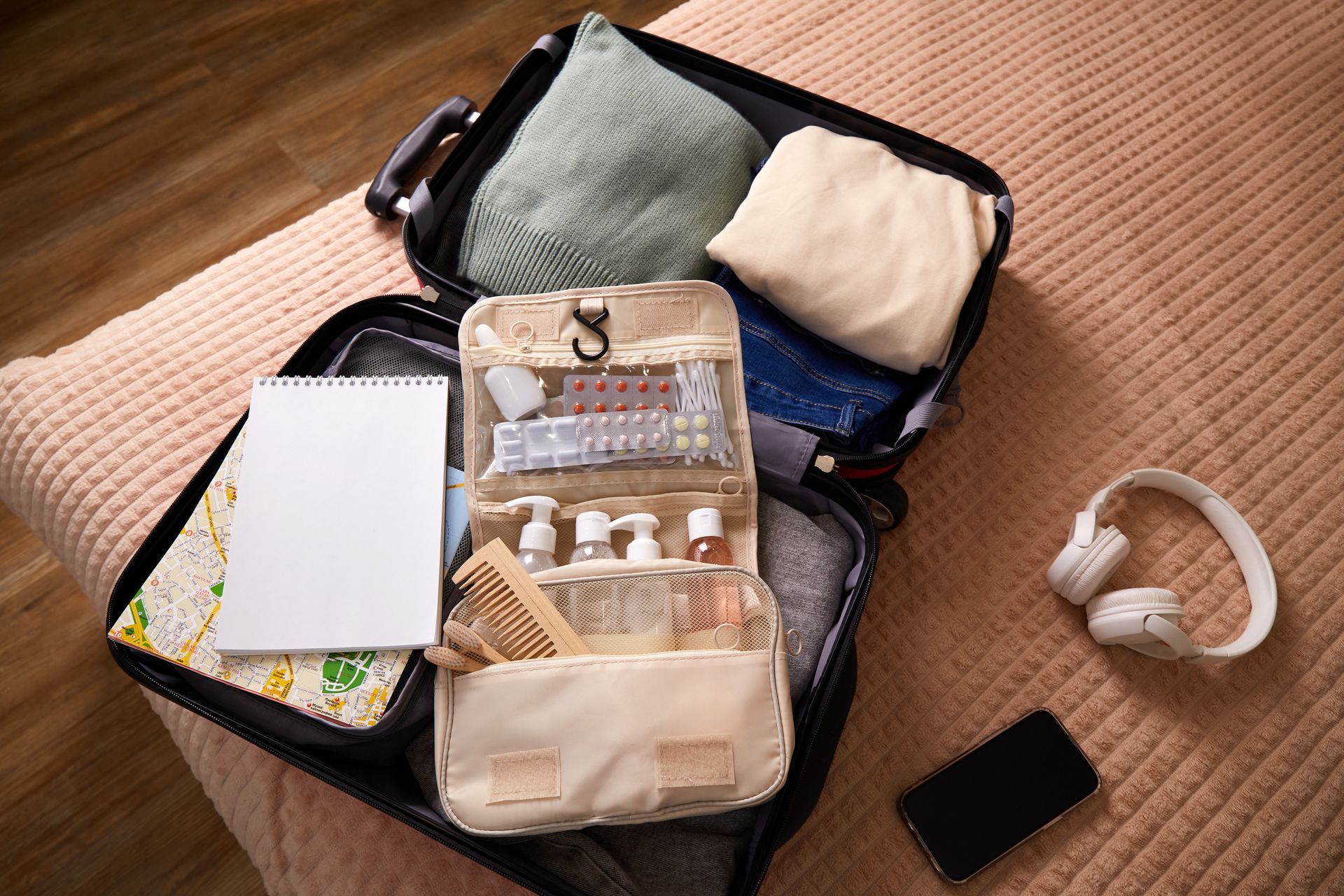Managing Medication While Traveling: Tips for Safety and Compliance

Traveling, whether for vacation, business or family visits can be an exciting break from routine. But for individuals who take regular medications, it can also pose some challenges. Managing medication while away from home requires planning, especially when it comes to time zone changes, prescription refills and keeping medications safe during transit.
At St. Hope Pharmacy, we’re committed to helping you stay on track with your prescriptions no matter where life takes you. With a little preparation and the right guidance, you can travel confidently without compromising your health.
1. Plan Ahead for Refills
One of the most common travel-related medication issues is running out of a prescription while away from home. Before your trip, check how many doses you have left. If you’re running low:
- Refill your prescriptions at least a week before you leave.
- Let your pharmacist know you’ll be traveling; they may be able to give you an early refill or extended supply.
- If you’re traveling for more than 30 days, ask about a vacation override with your insurance provider.
St. Hope Pharmacy offers personalized refill scheduling and can help coordinate with your doctor or insurance to make sure you have enough medication for your trip, including a few extra days’ worth in case of flight cancellations or unexpected delays.
2. Keep Medications in Their Original Containers
Always travel with medications in their original prescription bottles or labeled packaging. This serves several purposes:
- It helps airport security and customs agents verify your prescriptions.
- It prevents confusion about which medication is which.
- It includes dosage instructions and your doctor’s or pharmacy’s information in case of emergency.
You should still bring your pill organizer, if you use one, but packing your labeled bottles as well can help prevent security or customs headaches.
3. Pack Medications in Your Carry-On
Lost luggage can be an inconvenience, but if it contains essential medication, it can quickly turn into a serious problem. Always carry medications in your carry-on bag or personal item, not your checked luggage. This ensures:
- You have access to medication during flights or layovers.
- Medications that need to stay at room temperature don’t get too hot or cold.
- You can take your medication at the correct time, even during travel delays.
The TSA allows medically necessary liquids, gels and aerosols in reasonable quantities, even if they exceed the standard 3.4 oz limit. Just inform the agent during screening. Just make sure they’re clearly labeled and declare them to the TSA officer at the checkpoint.
4. Account for Time Zone Changes
If you’re crossing time zones, it’s important to adjust your medication schedule accordingly. For medications that must be taken at specific intervals, like insulin, seizure meds or birth control, ask your pharmacist for help creating a temporary schedule that aligns with your travel itinerary.
For most medications, shifting the timing gradually over a couple of days before or after your flight is safe. But for time-sensitive meds, especially those with a narrow therapeutic window, don’t guess. Talk to a pharmacist or your prescribing physician first.
5. Consider Storage Requirements
Some medications, such as insulin or certain antibiotics, need to be refrigerated. If you’re flying or driving for long periods:
- Use a cooler bag or insulated medication pouch with a cold pack.
- Keep the pack in your carry-on, not in the overhead bin or trunk where temperatures may fluctuate.
- Once you arrive, store the medication in a hotel refrigerator or request one in advance if needed.
Avoid placing medications in direct sunlight or a hot car, even for a short period. Heat can degrade many medications and reduce their effectiveness.
6. Bring a Medication List
Always travel with a written list of your current medications, including:
- Drug names (brand and generic)
- Dosages
- Frequency
- Prescribing doctor’s name
- Pharmacy contact information
In case of emergency, this list can be shared with medical professionals. It’s also helpful if you lose your medication and need a refill at a local pharmacy. Consider keeping both a printed copy and a digital version stored securely on your phone.
7. Know Local Laws and Customs
If you’re traveling internationally, research medication laws in your destination country. Some over-the-counter medications in the U.S. are controlled substances elsewhere, and certain prescription drugs may be prohibited or require special documentation. To stay compliant:
- Look up medication regulations for your destination before you travel, especially for controlled substances or injectable medications.
- Carry a doctor’s note or prescription letter for any medications that could raise questions at customs.
- Bring only what you need for the trip; excessive amounts may trigger scrutiny.
St. Hope Pharmacy can help you prepare documentation or find alternatives if your medication isn’t allowed abroad.
8. Stay Consistent and Set Reminders
When you’re out of your regular routine, it’s easy to forget a dose. To stay on track:
- Set phone alarms or use a medication reminder app.
- Build medication times into your travel plans (e.g., taking your pill with breakfast or before bed).
- Keep medications in a visible, consistent location, like a toiletry bag or nightstand.
Travel Confidently with Help from Our Houston Pharmacies
Whether you're going across the country or across the globe, managing your medications should never be a barrier to enjoying your trip. At St. Hope Pharmacy in Bellaire, Conroe, Houston, Sugar Land and Dickinson, we’re here to support you before, during and after your travels.
Contact us here on our website or visit one of our pharmacies in person for refill assistance and expert advice tailored to your unique needs.


